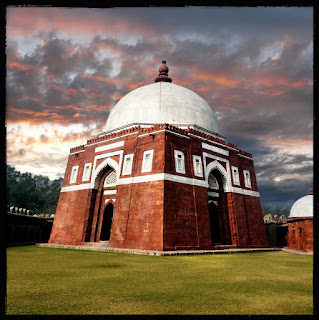Ghiasuddin Tughluq Shah
Sultan of Delhi during
Tughluq Dynasty
Reign – A.D. 8
September 1320 to February 1325
Died – February 1325,
Kara-Manikpur, India
The foundation of
Tughluq dynasty was laid by Ghazi Tughluq or Ghazi Malik who after his
accession in September, A.D. 1320 assumed the title of Ghiasuddin Tughluq Shah.
Ghiasuddin was born of a Hindu Jat mother. His father served the Sultanate of
Delhi during the reign of Balban. Ghazi Tughluq also worked under the
protective wings of Jalaluddin Khalji. He soon rose to prominence due to his
ability and capability.
Sultan Ghiasuddin
Tughluq Shah was an ideal monarch as he saved Islam in India from the invasions
of Mongols. He revolted against the usurper Khusrau Shah and re-strengthened
Islam in India. Besides being a protector of Islam in India, he was endowed
with many other qualities of head and heart.
His personal life
was ideal. He was neither devoted to wine nor to women. He not only obeyed the
principles of Islam but also paid honour to religions persons and saints. His
attitude towards the Hindus was fanatic but he did not suppress them. His
achievements testify that he was in ideal monarch.
Ghiasuddin
Tughluq was an efficient commander. His achievements before and after his
accession prove it. He devoted himself to the expansion of empire. Besides
conquering south, he established his control over Bengal and thus extended the
frontier far from the Khaljis. He established his control over the conquered
towns. He defeated the Mongols at several occasions and achieved success
against Warangal, Bengal and Tirhut.
He showed
extraordinary ability and farsightedness as a ruler. He abolished anarchy and
confusion and established law and order. He made several administrative
reforms. His revenue, judicial, administrative, army and financial reforms need
special mention.
He was a Sultan
who loved his public very much and he took up many works for the people’s
welfare. He was quite benevolent and charitable in nature. He tried to rule
according to the rules of the Quran. He was free from all those vices which
were haunting the nobles of those Days. Dr. Ishwari Prasad has remarked about
him, “Born of an Indian mother, Ghazi Malik typified in his character the
salient features of the two races, t he modesty and mildness of the Hindu and
the virility and vigour of the Turk.”
Besides having
the above virtues, Ghiasuddin was a patron of scholars. Amir Khusrau enhanced
the grandeur of his court. He was lover of architecture. He founded a city
about four kilometers away from Delhi, called Tughlaqabad and built a vast fort
there. His main palace was made of golden bricks which glittered in the light
of the sun. Ibn Batuta writes that there was a tank in the treasury of the
sultan in which melted gold was poured and it had become a solid rock.
Apart from these
virtues, he had some vices. He used to believe every person. He should have
remained cautious against his son. He should have remained cautious against his
son, Juna Khan, but he did not. He could not give up the fanaticism of his
times and resorted to religious in-toleration for the expansion of Islam. He
adopted an anti-Hindu policy due to his intolerant nature. However, Lanepoole
has praised him, “The trusty warden of marches proved a just, high-minded and
vigorous king.” Barani has also written about him, “All that Sultan Alauddin
did with so much bloodshed, and crooked policy and oppression, and great
violence in order that he might establish his rule through the cities of the
empire, Sultan Tughluq Shah accomplished in four years without any contention
or fraud or hardness of slaughter.”
S.R. Sharma,
comparing him with Jalaluddin Khalji, writes, “Jalaluddin’s reign was weak,
senile and fatuous: Ghiasuddin was strong, virile and fruitful. In essential
respects the former resembles the Mughal Emperor Bahadur Shah I, the latter
reminds us of Sher Shah Sur. Specially in administrative policy Tughlaq Shah I
must be considered the prototype of the later Sher Shah.”


0 टिप्पणियाँ:
एक टिप्पणी भेजें
THANKS FOR YOUR COMMENTS
टिप्पणी: केवल इस ब्लॉग का सदस्य टिप्पणी भेज सकता है.